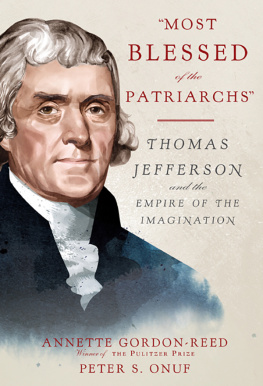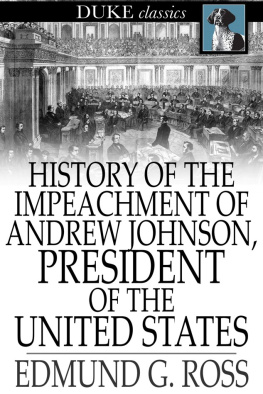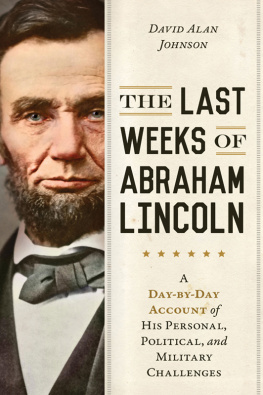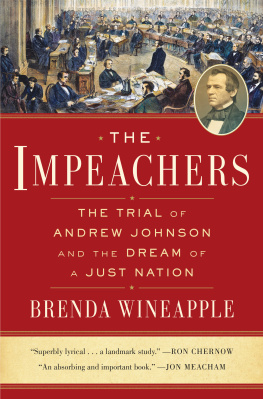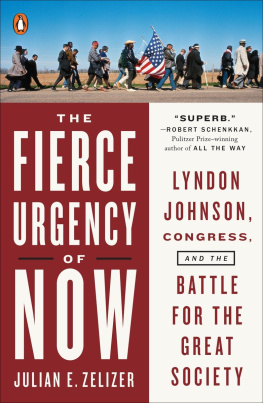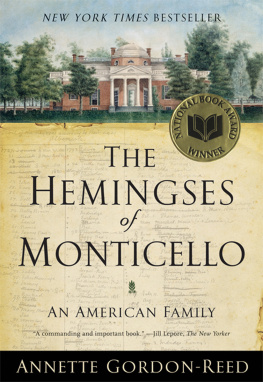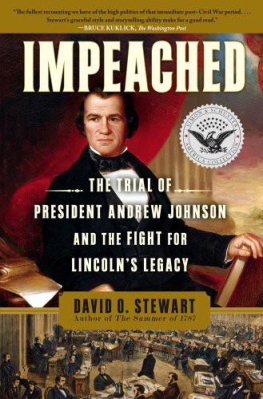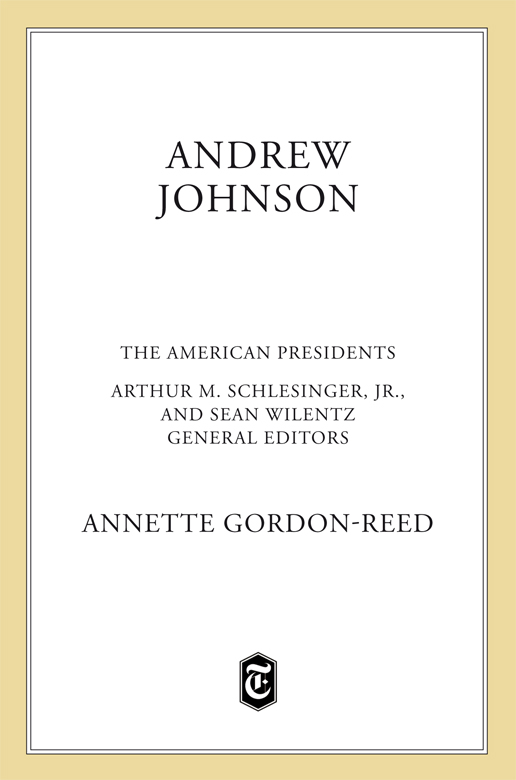To Vernon E. Jordan, Jr.,
and to the memory of Mary Belle Jordan,
for standing against everything Andrew Johnson stood for.
Contents
Introduction
The True Index of His Heart
Frederick Douglass saw it in a brief glance he exchanged with Andrew Johnson during one of the most important rituals in the life of the American nation, performed at the most trying time in the countrys history. It was March 4, 1865, and Abraham Lincoln and Andrew Johnson were about to be sworn in as president and vice president, respectively, of the United States of America. The forty-seven-year-old Douglass, the former enslaved man who had become a world-renowned abolitionist, had joined the throngs that descended upon Washington to witness the result of a seeming miracle. Four months earlier, the country had held a national election in the midst of a civil war and was now ready to return to office the man whom they had resoundingly reelected. Crowded conditionsthere was not a room to be had in all of Washingtonand a steady rain that produced a sea of mud at least ten inches deep plagued the festivities. Even with the horrid surroundings, Douglass would not have missed this for the world. His high hopes for the future of black Americans and the country as a whole rode, in large measure, on the man now returned to the helm of state. He had not hoped from afar, for he and Lincoln were well acquainted. Over the course of their association Douglass determined that while there might be differences in policy between them (he had, in fact, opposed Lincolns renomination in 1864), the president, unlike the majority of whites he had encountered in his life, viewed black people as human beings.
Douglass did not know Andrew Johnson when he came to Washington that day. But the inaugural proceedings gave him a chilling look at the man from Tennessee. Douglass wrote:
There are moments in the lives of most men, when the doors of their souls are open, and unconsciously to themselves, their true characters may be read by the observant eye. It was at such an instant when I caught a glimpse of the real nature of this man, which all subsequent developments proved true. I was standing in the crowd by the side of Mrs. Thomas J. Dorsey, when Mr. Lincoln touched Mr. Johnson and pointed me out to him. The first expression which came to his face, and which I think was the true index of his heart, was one of bitter contempt and aversion. Seeing that I had observed him, he tried to assume a more friendly appearance, but it was too late; it is useless to close the door when all within had been seen. His first glance was the frown of the man; the second was the bland and sickly smile of the demagogue. I turned to Mrs. Dorsey and said, Whatever Andrew Johnson may be, he is no friend of our race.
No friend of our race. The phrase likely falls quaint on modern ears, fixed in a past when blacks in America had to cultivate white friends to act as their surrogates in the political arena and make the case for fair, or at least not hostile, treatment. The overwhelming majority of the 4 million blacks in Douglasss America were enslaved, and those who were not lived as second-class citizens, or worse, in communities throughout the country. Despite some very real and persistent problems, their twenty-first-century descendants, who have the right to vote and hold public office, even the highest one in the land, exercise a degree of political, social, and economic power that would have stunned Frederick Douglass. If the man whom Douglass observed that day had had his way, none of this would ever have happened. Throughout the entirety of his political career Andrew Johnson did everything he could to make sure blacks would never become equal citizens in the United States of America. Tragically, he was able to bring the full force and prestige of the American presidency to the effort.
The Sage of Anacostia got it exactly right: Johnson was no friend to black people, at a time when blacks needed all the friends they could get. Because he believed that Lincoln would be the one to guide the United States to victory in the still-raging war, and help bring blacks to a new day, Douglass could afford to remark calmly to his companion when he came face-to-face with Johnsons true nature. He would have wailed (and probably did when it happened) had he any inkling that just a few weeks after that telling moment, an assassins bullet would place the political fate of African Americans into the hands of a man who despised them.
Were it not so thoroughly steeped in mindless tragedythe first assassination of an American president, the destruction of the hopes of a people long treated as property who thought they were finally going to be able to live in dignity and peace, the lost chance to make the promise of America real to all who lived hereone might be content to cast Andrew Johnsons time in the White House as a form of cosmic joke. The gods were playing tricks on us, giving us Abraham Lincoln exactly when we needed him, having him cut down by an inconsequential person, and then giving us Andrew Johnson to teach us the folly of even imagining that we controlled our own destinies. But the effects of Johnsons presidency were too profound, too far rangingreaching into twenty-first-century Americato be considered anything approaching a joke or trick, even one to teach an important lesson.
To be fair to Johnson, any man would have had a tough time following Abraham Lincoln, particularly under the circumstances that ended his presidency. Even before mythology set in and added further luster to his image, many Americans well understood that Lincoln was an extraordinary man who had risen admirably to an excruciatingly difficult occasion. It is hard to imagine one better suited by temperament, experience, talent, and intellect to be at the head of the government as the United States faced its long-postponed day of reckoning about the place of chattel slavery in the American republic. The founding generation that brought forth George Washington, Thomas Jefferson, James Madison, Benjamin Franklin, and Alexander Hamilton had been unwilling to grapple with the issue at the countrys beginnings, and now it fell to the former rail splitter and lawyer from Illinois to see matters through. Did the times make the man, or did the man make the times? it is often asked. The answer, in Lincolns case, seems to be yes on both counts. He brought astral political skills to the presidency but did not stop there. He continued to grow and change as new problems and circumstances presented themselves. He was brilliant enough to know when to be flexible and was then supple in executing the revisions to his thoughts to meet challenges as they arose. Although he had moments of doubt and suffered from crushing depression, he had enough basic confidence in himself not to feel threatened by required changes of heart and of direction.
Andrew Johnson was a different specimen altogether, a near polar opposite of Lincoln in his leadership style and temperamenteven though on the surface he and Lincoln had much in common. They began life in roughly the same social position: both were born toward the bottom of the social ladder in the hierarchical world of the nineteenth century. Womenin Lincolns case his mother and stepmother, and in Johnsons case his wifeplayed pivotal roles in furthering their educations and preparing them for their later roles in public life. Although they had different styles of presentation, both men were natural communicators who could hold and impress audiencesLincoln with his gift for storytelling, perfect pitch for the instructive anecdote, and eloquent speech writing; Johnson with his fiery, from the gut, extemporaneous oratory that could whip audiences into a frenzy. The two men used these gifts to rise above their humble origins, powered by the force of their incandescent ambition, competitive natures, and native intelligence (though Johnson was not Lincolns equal on this score).


